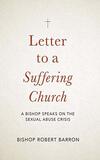
The Emperor Napoleon is said to have confronted Cardinal Consalvi, the secretary of state to Pope Pius VII, saying that he, Napoleon, would destroy the Church—to which the Cardinal deftly responded, “Oh my little man, you think you’re going to succeed in accomplishing what centuries of priests and bishops have tried and failed to do?
I am not Catholic, although I go to mass every Sunday (plus a few). My immediate family and much of my extended family are Catholic and I’ve always seen a certain beauty to the core of Catholic belief and the idea of thousands of years of tradition.
I’ve known for years in a sort of peripheral way about the sex abuse scandals surrounding the Church, but so far as I’m aware, it’s always been several levels removed. I hope I’m not wrong. I’d heard that something big had happened in the Philadelphia diocese and that cover-ups from the church were involved, but I’d never really looked into the extent of details. Bishop Barron starts with the details, heinous as they are. He doesn’t look to sweep it under the rug, which I can appreciate.
He then goes on to clarify a few things. The abuse cases in the Catholic Church have been dropping for decades. They’ve dropped even more dramatically after 2002 when additional protections were put into place, including more stringent background screening and the involvement of lay/non-church panels. This is good news. Corruption will happen. People will fail. Even among those who are supposed to know better–to be better. But one should always trust… and then verify. This does that, and I’m happy to hear it happening.
It’s also interesting to put the modern scandals in something of a historical context. There are a great many disturbing verses in the Old Testament and Bishop Barron goes into many of them, pointing out that they are in fact examples of sex and love gone awry. I do not agree with the Catholic Church entirely on their teachings of love and sexuality, but it is interesting to see the parallels and the basis he is coming from. Going from there into two thousand years of Church scandal also does serve to apply some perspective. Church leaders have done terrible things over the last two millennia–but I would argue that any organization that old has some pretty impressive skeletons in their closets. And for the most part, the Church has dealt with these issues and emerged the stronger for it. I only hope that this is another such case.
I think the thing that annoyed me most about Bishop Barron’s commentary–and perhaps this is my point of view as a non-Catholic–was the idea that it was instrumented by the devil. He doesn’t particularly go out and say it, being very careful in his wording, but I thought the implication was clear.
It seems so thoroughly thought through , so comprehensively intentional. Certainly, in the ordinary run of history, bad things happen, but this scandal is just too exquisitely designed. … If the Church had a personal enemy– and indeed the devil is known as the enemy of the human race–it is hard to imagine that he could have come up with a better plan.
Overall, it was an disturbing yet thought provoking read. It certainly won’t be the text that convinces me to convert–I would be surprised if such a document existed–but it does make hopeful to know that there are those among the leadership of the Church like Bishop Barron.
If you are Catholic or even if you know someone Catholic and want to know more about the recent scandals and where the Church may go from here, you could do far worse than giving this a chance. It’s a quick 100 pages, but it certainly has an impact.
In the end, we are not Catholics because our leaders are flawless, but because we find the claims of Catholicism both compelling and beautiful. We are Catholics because the Church speaks of the Trinitarian God whose very nature is love; of Jesus the Lord, crucified and risen from the dead; of the Holy Spirit, who inspires the followers of Christ up and down the ages; of the sacraments, which convey the Christ-life to us; and of the saints, who are our friends in the spiritual order. This is the treasure; this is why we stay.